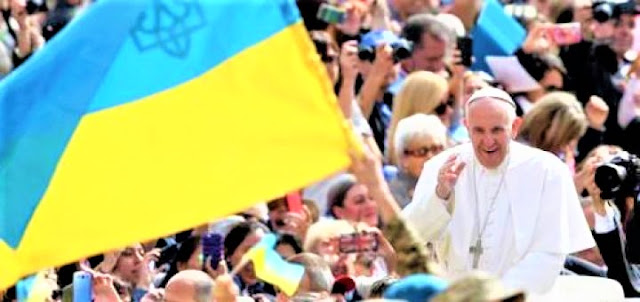Pope Francis' Charity at the Vatican is Collecting Warm Winter Clothing for People in Ukraine which Lack's Electricity and Gas
Pope Francis’ special office for charitable activities announced a collection of thermal jackets to help Ukrainians survive the harsh winter as power is limited due to Russian attacks on energy infrastructure.
As the cold sets in Ukraine and the winter heating crisis begins, the Dicastery for the Service of Charity has announced a new outreach campaign to help Ukrainians survive the harsh winter ahead.
The Pope’s special office for charity activities, also known as the Apostolic Almsgiving (Elemosineria Apostolica), is collecting warm clothes and plans to send them within a month's time with trucks.
“The Ukrainian people are experiencing an emergency linked not only to the war, but also to the lack of electricity, gas, and the bitter cold winter", reads a communiqué signed by the Apostolic Almoner, Cardinal Konrad Krajewski.
Anyone wishing to join the initiative can send thermal jumpers to the dicastery’s headquarters in the Vatican (address: Cortile Sant'Egidio, 00120 Vatican City).
7 million internally displaced Ukrainians already facing freezing winter
The UNHCR, the UN refugee agency, says some 7 million internally displaced Ukrainians are already facing freezing winter conditions after being forced to flee their homes. Many are taking shelter in damaged buildings with no access to electricity and heating.
The heating crisis has worsened after Russia stepped up its missile strikes on Ukraine’s civilian energy sites, causing power shortages nationwide, also seriously affecting Ukrainian nuclear power plants. In late November for the first time ever, all 15 of its nuclear reactors were taken offline by fighting.
50% of the Ukraine’s power plants have detroyed
Nuclear plants supply power to the grid when operating, but when shut down they actually draw power from it in order to run vital cooling and safety systems, which means disruption to electricity supply is a major concern.
Russian troops also still hold control of Zaporizhzhia Nuclear Power Plant, the largest nuclear power station in Europe, where ongoing cross-fire shelling has been posing a serious threat to nuclear safety.
According to the Ukrainian government 50% of the country’s power plants have been destroyed.
Aid to the Church in Need providing wooden stoves
Power shortages are also seriously affecting church communities in Ukraine. For this reason the pontifical foundation Aid to the Church in Need (ACN) has recently approved a financial aid package for the purchase of wood stoves and generators, including 40 small generators for the Exarchate of Donetsk, where two priests were recently taken into custody by Russian militia.
There are also plans to change heating systems in three parishes, two convents for women religious, one bishop’s residence, a parish house and the Ternopil seminary. One example of this aid is the purchase of wooden stoves for the Diocese of Kharkiv-Zaporizhzhia, in eastern Ukraine, where the winters are particularly harsh. Part of the diocese is still occupied by Russian forces, but the houses in the liberated territory are almost all partially or completely destroyed.
Concern over the bitter winter cold led the local bishop to ask ACN for help. “It is going to be a big challenge to warm homes and cook food, because not everybody has access to electricity or gas. Many people have come to us asking for help,” Bishop Pavlo Honcharuk told ACN, which offered help in the form of the wooden stoves that were requested.
Faced with the shortages of electricity and gas, many are trying to change to different heating systems. The rector of the seminary of Ternopil, Father Ivan Rymar, is one of many who have asked for help to switch from natural gas to combustible pellets, made of compressed wood chips, a more reliable fuel source. The seminary already produces pellets, and thanks to the help provided by ACN it can significantly reduce the cost of heating the seminary.
Edited from a Vatican News report By Lisa Zengarini

Comments